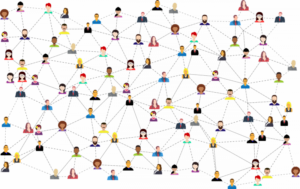
The COVID-19 crisis has ushered in a new era of world history, and continues to have a profound impact on daily life around the world, including the Bay Area. But the fight against this global pandemic also includes a regional public health tool: contact tracing. News outlets and public health officials often say that manual contact tracing is key to protecting the community.
The Oral History Center hopes to launch a project about contact tracing that will document the historic nature of the work, as well as evaluate its effectiveness in this moment as it relates to public health, community, and politics.
Interested in helping to make this project a reality? We are now accepting tax-deductible donations!
Contact tracing, the process of charting the chain of infection to control transmission, has been practiced since the 1930s. It first played a key role in reducing the spread of syphilis among U.S. troops during World War II. Later, public health advisers, referred to as P.H.A.s, used this strategy to control tuberculosis, smallpox, and the 2009 H1N1 Pandemic. Early P.H.A.s were required to have a college degree, preferably in liberal arts, with a variety of work experience that gave them enough emotional intelligence to form connections with anyone from business executives to rural farmers. P.H.A.s have been incredibly successful in reducing the spread of disease and infection, and were responsible for blowing the whistle on the Tuskegee experiment.
The process has shifted since then, especially during the COVID-19 pandemic, and experts often cite contact tracing as the key to mitigating the spread of the coronavirus. Job requirements are different, and in San Francisco, furloughed city employees––like librarians, city attorneys, and tax assessors––are filling these roles previously held exclusively by P.H.A.s.
As the COVID-19 crisis continues to reshape all facets of life, it is essential to explore the experiences of public health experts and contact tracers in real time. The OHC hopes to record and archive oral history interviews with contact tracers and others who are fighting COVID-19 by planning health policy, analyzing data, and tracking the human toll of the outbreak. In-depth topical interviews about tracking the spread of the virus will document the current moment and the intensive human work of manual contact tracing.
Help us make this project a reality by making a tax-deductible donation here.
*Note: Please check “This Gift is in the Honor or Memory of Someone” when you make your donation. Please write “Contact” for the first name, and “Tracing” for the last name fields.
Thank you for supporting our work!
Interested in learning more? Contact Shanna Farrell (sfarrell@library.berkeley.edu) or Amanda Tewes (atewes@berkeley.edu).